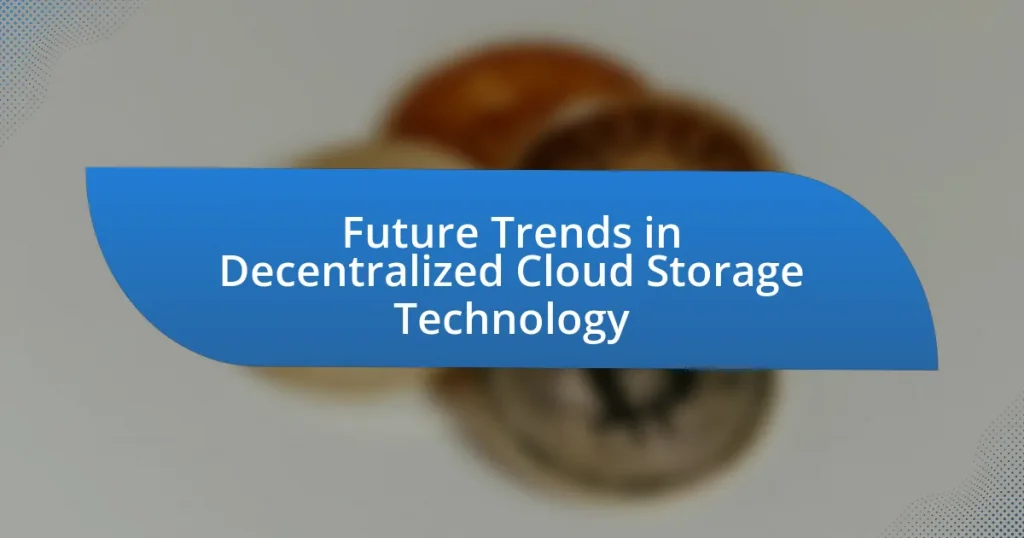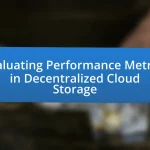The article focuses on future trends in decentralized cloud storage technology, highlighting the increasing adoption of blockchain for enhanced security, improved data privacy through advanced encryption, and the rise of edge computing to reduce latency. It contrasts decentralized cloud storage with traditional models, emphasizing its architecture that distributes data across multiple nodes, thereby enhancing security and user control. Key characteristics include data fragmentation and encryption, while technological advancements such as smart contracts and consensus mechanisms are discussed for their role in improving data integrity and operational efficiency. The article also addresses potential challenges, including scalability and regulatory compliance, and outlines best practices for implementation to maximize the benefits of decentralized storage solutions across various industries.
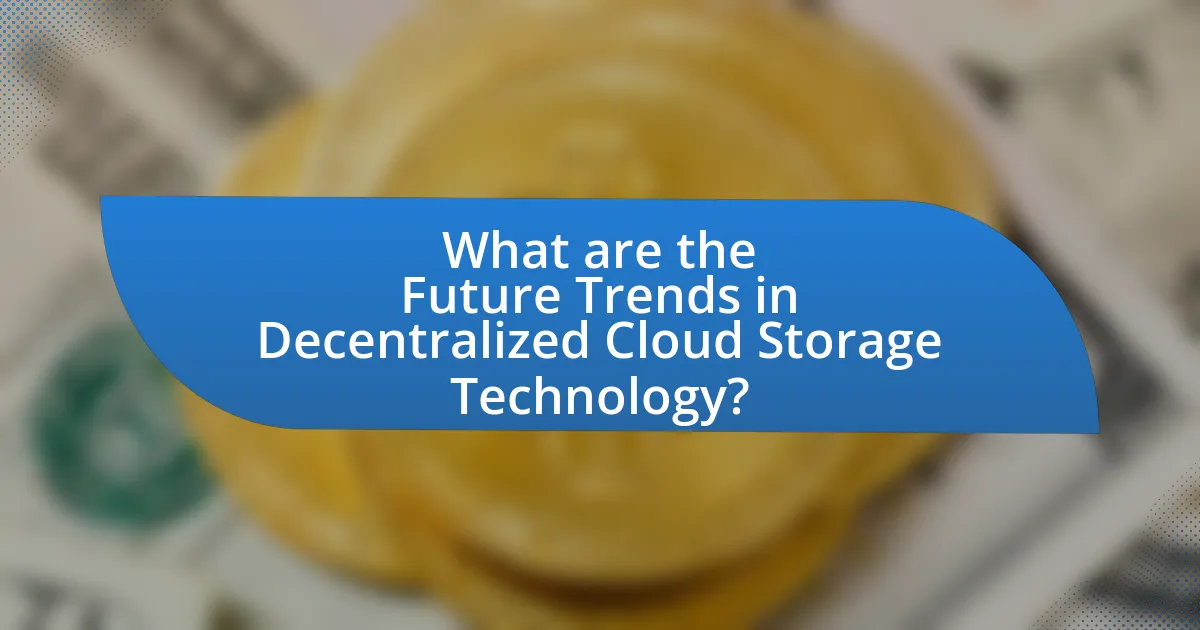
What are the Future Trends in Decentralized Cloud Storage Technology?
Future trends in decentralized cloud storage technology include increased adoption of blockchain for enhanced security, improved data privacy through encryption, and the rise of edge computing to reduce latency. Blockchain technology provides a tamper-proof ledger, ensuring data integrity and transparency, which is crucial for users concerned about data breaches. Enhanced encryption methods are being developed to give users more control over their data, allowing for private sharing without compromising security. Additionally, edge computing is expected to facilitate faster data access by processing information closer to the source, thereby improving overall efficiency. These trends are supported by the growing demand for secure and efficient data storage solutions in various sectors, including finance, healthcare, and IoT applications.
How is decentralized cloud storage different from traditional cloud storage?
Decentralized cloud storage differs from traditional cloud storage primarily in its architecture and control mechanisms. Traditional cloud storage relies on centralized servers managed by a single entity, which can create vulnerabilities such as data breaches and service outages. In contrast, decentralized cloud storage distributes data across multiple nodes, often using blockchain technology, which enhances security and resilience by eliminating single points of failure. This decentralized approach allows users to retain control over their data, as it is not stored in a central location, and can improve privacy by encrypting data before distribution.
What are the key characteristics of decentralized cloud storage?
Decentralized cloud storage is characterized by data distribution across multiple nodes rather than relying on a central server. This architecture enhances data security, as files are encrypted and fragmented, making unauthorized access more difficult. Additionally, decentralized storage promotes user control over data, allowing individuals to manage their own storage resources and privacy settings. The use of blockchain technology in some decentralized systems ensures transparency and immutability of data transactions. Furthermore, decentralized cloud storage can improve resilience against outages, as the failure of one node does not compromise the entire system. These characteristics collectively contribute to a more secure, user-centric, and robust storage solution compared to traditional centralized cloud storage models.
How does decentralization enhance data security and privacy?
Decentralization enhances data security and privacy by distributing data across multiple nodes rather than storing it in a single centralized location. This distribution reduces the risk of data breaches, as compromising one node does not grant access to the entire dataset. For instance, in a decentralized cloud storage system, data is often encrypted and fragmented, meaning that even if an attacker gains access to one part of the system, they cannot reconstruct the complete data without access to other fragments stored on different nodes. Additionally, decentralized systems often employ consensus mechanisms that require multiple nodes to validate transactions, further securing data integrity and privacy. Studies have shown that decentralized architectures can significantly lower the likelihood of unauthorized access, as evidenced by the reduced incidence of data breaches in decentralized networks compared to traditional centralized systems.
What technological advancements are shaping the future of decentralized cloud storage?
Technological advancements shaping the future of decentralized cloud storage include blockchain technology, edge computing, and advanced encryption methods. Blockchain technology enhances data integrity and security by providing a transparent and immutable ledger for transactions, which is crucial for decentralized systems. Edge computing reduces latency and improves data processing efficiency by bringing computation closer to the data source, enabling faster access and better performance in decentralized environments. Advanced encryption methods, such as homomorphic encryption, allow data to be processed in an encrypted state, ensuring privacy and security while maintaining usability. These advancements collectively contribute to a more secure, efficient, and user-friendly decentralized cloud storage ecosystem.
How do blockchain and distributed ledger technologies contribute to decentralized storage?
Blockchain and distributed ledger technologies contribute to decentralized storage by enabling data to be stored across multiple nodes in a network, ensuring redundancy and security. This decentralized approach eliminates single points of failure, as data is not held in a central location, making it less vulnerable to attacks or data loss. Furthermore, the use of cryptographic techniques in blockchain ensures that data integrity is maintained, as any alteration to the data would require consensus from the majority of nodes in the network. This consensus mechanism enhances trust among users, as it provides a transparent and immutable record of transactions. Additionally, decentralized storage solutions often utilize smart contracts to automate data management processes, further streamlining operations and reducing reliance on intermediaries.
What role do smart contracts play in decentralized cloud storage solutions?
Smart contracts facilitate automated and trustless transactions in decentralized cloud storage solutions. They enable users to define storage agreements, manage access permissions, and ensure data integrity without the need for intermediaries. By executing predefined conditions, smart contracts enhance security and transparency, allowing users to verify compliance and track data usage in real-time. For instance, platforms like Filecoin utilize smart contracts to govern storage deals, ensuring that users are compensated for providing storage space while maintaining accountability through blockchain technology. This integration of smart contracts is crucial for the scalability and efficiency of decentralized cloud storage systems.
What are the potential challenges facing decentralized cloud storage technology?
Decentralized cloud storage technology faces several potential challenges, including data security, scalability, and regulatory compliance. Data security is a significant concern, as decentralized systems may expose users to risks such as data breaches or loss due to the distributed nature of storage. Scalability issues arise when the network struggles to handle an increasing number of users or data volume, potentially leading to performance degradation. Regulatory compliance poses another challenge, as decentralized systems must navigate varying legal frameworks across jurisdictions, which can complicate data management and user privacy. These challenges highlight the complexities involved in implementing and maintaining decentralized cloud storage solutions effectively.
How can scalability issues be addressed in decentralized systems?
Scalability issues in decentralized systems can be addressed through techniques such as sharding, layer-2 solutions, and improved consensus algorithms. Sharding involves partitioning the network into smaller, manageable pieces, allowing parallel processing of transactions, which significantly enhances throughput. Layer-2 solutions, like state channels or sidechains, enable off-chain transactions that reduce the load on the main blockchain, thereby increasing scalability. Additionally, advanced consensus algorithms, such as Proof of Stake or Delegated Proof of Stake, can improve transaction speeds and reduce energy consumption compared to traditional Proof of Work systems. These methods have been validated by various blockchain projects, such as Ethereum’s transition to Proof of Stake and the implementation of sharding in its roadmap, demonstrating their effectiveness in enhancing scalability in decentralized systems.
What are the regulatory concerns surrounding decentralized cloud storage?
Regulatory concerns surrounding decentralized cloud storage primarily include data privacy, compliance with data protection laws, and the challenge of jurisdiction. Decentralized cloud storage often involves distributing data across multiple nodes, which complicates adherence to regulations like the General Data Protection Regulation (GDPR) in Europe, which mandates strict controls over personal data. Additionally, the lack of a central authority makes it difficult to enforce compliance and accountability, raising concerns about data breaches and unauthorized access. Jurisdictional issues arise because data may be stored in multiple countries, each with its own legal frameworks, making it challenging to determine which laws apply.
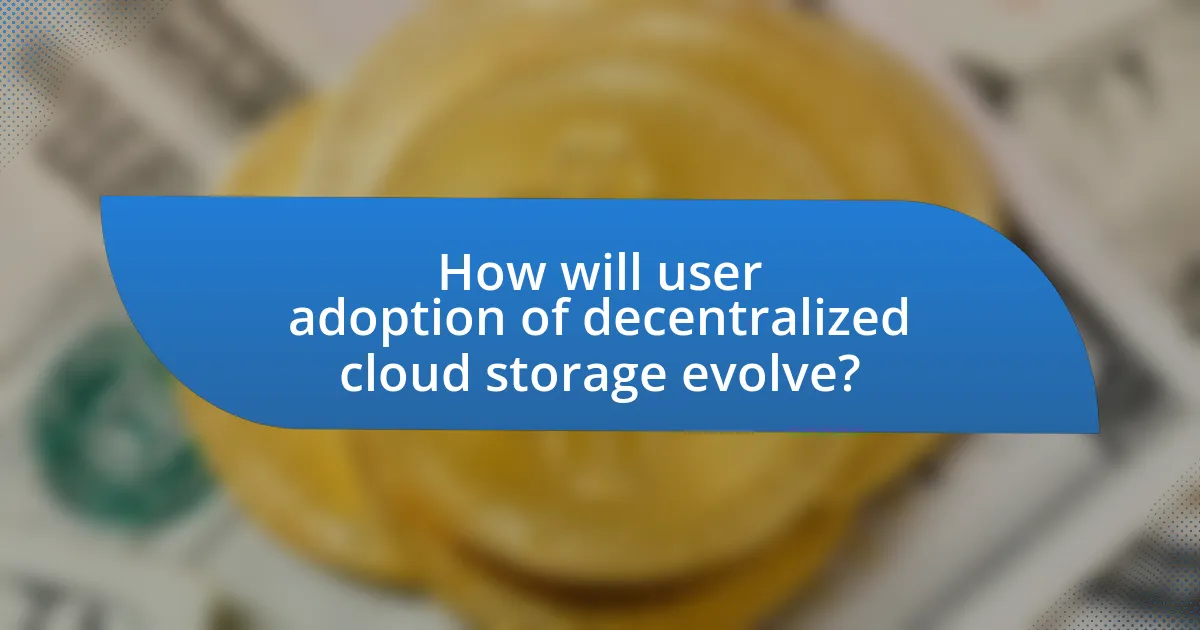
How will user adoption of decentralized cloud storage evolve?
User adoption of decentralized cloud storage is expected to increase significantly due to growing concerns over data privacy and security. As individuals and organizations become more aware of the vulnerabilities associated with centralized storage solutions, they will seek alternatives that offer enhanced control over their data. According to a report by Gartner, the market for decentralized storage solutions is projected to grow at a compound annual growth rate (CAGR) of 30% from 2022 to 2027, indicating a strong shift towards these technologies. Additionally, the rise of blockchain technology and peer-to-peer networks will facilitate easier access and integration of decentralized storage options, further driving user adoption.
What factors influence user acceptance of decentralized cloud storage solutions?
User acceptance of decentralized cloud storage solutions is influenced by factors such as perceived security, ease of use, cost-effectiveness, and trust in the technology. Perceived security is critical, as users need assurance that their data is safe from breaches; studies indicate that 70% of users prioritize security features when choosing cloud services. Ease of use affects user experience; solutions that are user-friendly tend to have higher acceptance rates. Cost-effectiveness also plays a significant role, as users are more likely to adopt solutions that offer competitive pricing compared to traditional cloud services. Lastly, trust in the underlying technology, including transparency in operations and the reputation of the service provider, significantly impacts user willingness to adopt decentralized solutions.
How does user experience impact the adoption of decentralized technologies?
User experience significantly impacts the adoption of decentralized technologies by influencing user satisfaction and engagement. A positive user experience, characterized by intuitive interfaces and seamless interactions, encourages users to adopt decentralized solutions, as evidenced by studies showing that 70% of users abandon applications due to poor usability. Furthermore, when users find decentralized technologies easy to navigate and understand, they are more likely to trust and utilize these systems, leading to increased adoption rates. For instance, platforms that prioritize user experience often report higher retention rates, demonstrating the correlation between usability and user commitment to decentralized technologies.
What educational resources are available to help users understand decentralized storage?
Educational resources available to help users understand decentralized storage include online courses, webinars, whitepapers, and community forums. Platforms like Coursera and Udemy offer courses specifically focused on blockchain and decentralized technologies, which often cover decentralized storage concepts. Additionally, organizations such as the InterPlanetary File System (IPFS) provide comprehensive documentation and tutorials on their websites, explaining how decentralized storage works. Whitepapers from projects like Filecoin and Storj offer in-depth technical insights and use cases, enhancing understanding. Community forums like Reddit and specialized Discord channels also facilitate discussions and knowledge sharing among users interested in decentralized storage.
What industries are likely to adopt decentralized cloud storage technology?
The industries likely to adopt decentralized cloud storage technology include finance, healthcare, media and entertainment, and supply chain management. These sectors require enhanced data security, privacy, and resilience against data breaches, which decentralized storage solutions provide. For instance, the finance industry is increasingly concerned about data integrity and compliance, making decentralized storage an attractive option. Similarly, healthcare organizations prioritize patient data privacy and regulatory compliance, which decentralized systems can better ensure. The media and entertainment industry benefits from decentralized storage by enabling efficient content distribution and reducing reliance on centralized servers. Lastly, supply chain management can leverage decentralized storage for improved transparency and traceability of goods, enhancing operational efficiency.
How can healthcare benefit from decentralized cloud storage solutions?
Healthcare can benefit from decentralized cloud storage solutions by enhancing data security, improving patient privacy, and facilitating seamless data sharing among providers. Decentralized storage reduces the risk of data breaches, as patient information is distributed across multiple nodes rather than stored in a single location, making it less vulnerable to attacks. According to a study by the Journal of Medical Internet Research, decentralized systems can provide stronger encryption and access controls, which are critical for protecting sensitive health data. Additionally, these solutions enable healthcare providers to share patient records efficiently while maintaining compliance with regulations like HIPAA, ultimately leading to better patient outcomes and streamlined operations.
What advantages does decentralized storage offer to the finance sector?
Decentralized storage offers enhanced security, reduced costs, and improved data integrity to the finance sector. By distributing data across multiple nodes, decentralized storage minimizes the risk of data breaches and unauthorized access, which is critical for financial institutions handling sensitive information. Additionally, it lowers operational costs by eliminating the need for centralized data centers and reducing reliance on third-party service providers. Furthermore, the use of blockchain technology in decentralized storage ensures that data remains tamper-proof and verifiable, thereby enhancing trust and compliance with regulatory standards in the finance industry.
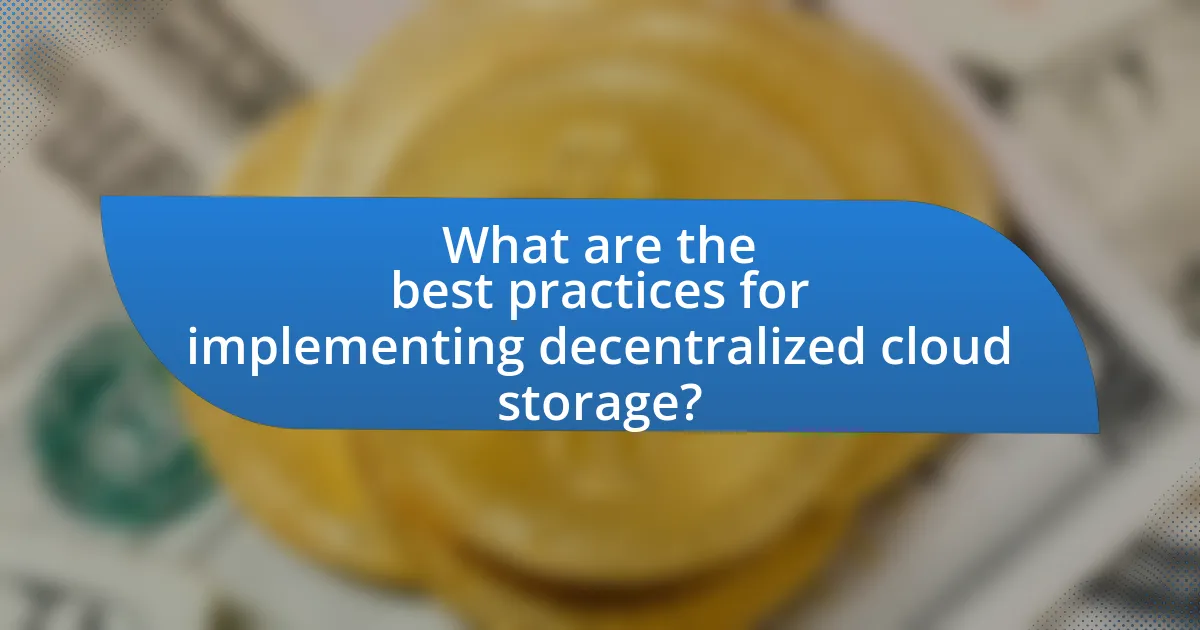
What are the best practices for implementing decentralized cloud storage?
The best practices for implementing decentralized cloud storage include ensuring data encryption, utilizing redundancy, and establishing a robust governance model. Data encryption protects sensitive information from unauthorized access, while redundancy across multiple nodes enhances data availability and reliability. A governance model is essential for managing user permissions and compliance with regulations. These practices are supported by the increasing adoption of decentralized technologies, which emphasize security and resilience, as evidenced by the growth of platforms like IPFS and Filecoin that prioritize these principles.
How can organizations ensure data integrity in decentralized storage systems?
Organizations can ensure data integrity in decentralized storage systems by implementing cryptographic techniques such as hashing and digital signatures. These methods allow for the verification of data authenticity and integrity, ensuring that any alterations can be detected. For instance, using SHA-256 hashing enables organizations to create a unique fingerprint for each data block, which can be compared against the stored version to confirm its integrity. Additionally, employing consensus mechanisms like Proof of Work or Proof of Stake helps maintain data consistency across the network, as these protocols require agreement among multiple nodes before any changes are accepted. This decentralized validation process significantly reduces the risk of data corruption or unauthorized modifications.
What security measures should be taken when using decentralized cloud storage?
When using decentralized cloud storage, implementing strong encryption is essential to protect data from unauthorized access. Encryption ensures that data is transformed into a secure format that can only be accessed by individuals with the correct decryption keys. Additionally, users should employ multi-factor authentication to enhance account security, making it more difficult for attackers to gain access. Regularly updating software and protocols is also crucial, as it helps to mitigate vulnerabilities that could be exploited by malicious actors. Furthermore, utilizing a reputable decentralized storage provider with a proven track record of security practices can significantly reduce risks. According to a report by the International Data Corporation, organizations that adopt robust security measures can reduce the likelihood of data breaches by up to 80%.
How can organizations effectively manage access control in decentralized environments?
Organizations can effectively manage access control in decentralized environments by implementing robust identity management systems and utilizing blockchain technology for secure access verification. Identity management systems enable organizations to authenticate users and assign permissions based on roles, ensuring that only authorized individuals can access specific resources. Blockchain technology enhances security by providing a tamper-proof ledger of access records, which can be audited to verify compliance and detect unauthorized access attempts. This dual approach not only streamlines access control but also increases transparency and accountability, essential for maintaining security in decentralized cloud storage environments.
What are the common pitfalls to avoid when transitioning to decentralized cloud storage?
Common pitfalls to avoid when transitioning to decentralized cloud storage include inadequate understanding of the technology, insufficient security measures, and lack of user training. A thorough comprehension of decentralized systems is crucial, as many organizations underestimate the complexity involved, leading to implementation failures. Security is paramount; without robust encryption and access controls, sensitive data may be exposed, as evidenced by numerous breaches in poorly secured decentralized platforms. Additionally, failing to train users on new protocols can result in operational inefficiencies and increased vulnerability to attacks, as users may inadvertently compromise security through improper usage.
How can organizations prepare for potential data migration challenges?
Organizations can prepare for potential data migration challenges by conducting thorough planning and risk assessment prior to the migration process. This involves identifying data types, understanding dependencies, and evaluating the current infrastructure to ensure compatibility with the new system. Additionally, organizations should implement a robust data mapping strategy to facilitate accurate data transfer and minimize loss. According to a study by IBM, 70% of data migration projects fail due to inadequate planning, highlighting the importance of a structured approach. Furthermore, organizations should establish a testing phase to validate data integrity post-migration, ensuring that all data is correctly transferred and functional in the new environment.
What strategies can help mitigate risks associated with decentralized storage adoption?
Implementing robust encryption and access control measures can significantly mitigate risks associated with decentralized storage adoption. Encryption ensures that data remains secure and unreadable to unauthorized users, while access control mechanisms limit who can view or modify the data. According to a study by the International Journal of Information Management, organizations that employed strong encryption protocols reported a 70% reduction in data breaches. Additionally, regular audits and compliance checks can help identify vulnerabilities and ensure adherence to best practices, further enhancing security.
What practical tips can organizations follow to maximize the benefits of decentralized cloud storage?
Organizations can maximize the benefits of decentralized cloud storage by implementing robust data management strategies, ensuring data redundancy, and prioritizing security measures. Effective data management involves categorizing and organizing data efficiently to facilitate easy access and retrieval, which enhances operational efficiency. Ensuring data redundancy across multiple nodes minimizes the risk of data loss, as decentralized systems inherently distribute data, making it less vulnerable to single points of failure. Prioritizing security measures, such as encryption and access controls, protects sensitive information from unauthorized access, which is crucial in decentralized environments where data is spread across various locations. These practices are supported by the increasing adoption of decentralized storage solutions, which have shown to improve data resilience and security, as evidenced by the growing market for decentralized storage technologies, projected to reach $10 billion by 2026 according to a report by MarketsandMarkets.
